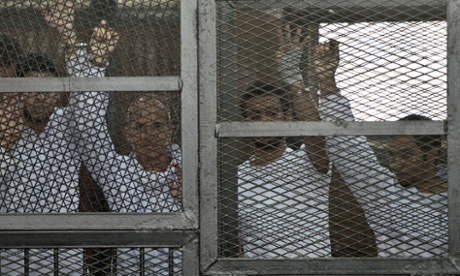
The continued detention of Australian Peter Greste and his colleagues sends a message to all journalists working in Egypt: 'no one is safe'
In just a few hours, Australian journalist Peter Greste and his colleagues are due to face court in Cairo, charged under terrorism offences for a crime that normally warrants praise, not a lengthy prison sentence.
The last time we saw Greste and his co-defendants was two weeks ago on 10 April. Greste, 48, has been detained since 29 December last year, along with Canadian-Egyptian Mohamed Fahmy and Egyptian Baher Mohamed. The three journalists have been under trial for charges of “fabricating false news”, “supporting the Muslim Brotherhood” and “defaming Egypt internationally”.
Handcuffed, Greste entered the courtroom iron cage, his hands tied with his co-defendants. I watched intently as Fahmy shouted to the judge “the handcuff!” raising his arm up, upon which the presiding judge ordered police to free their hands.
During the session Greste watched an Egyptian judge puzzled by the contents of his backpack: a USB flash drive and a wireless USB. The judge asked the “expert”, a police officer, to show the contents of the flash drive. It contained two videos: some video footage from Kenya and a BBC documentary on Somalia presented by Greste. Greste’s lawyer objected that the videos were irrelevant to the case, as they were shot outside Egypt.
Greste and the two other journalists could face anything from three years to a life sentence. Local and international human rights NGOs have described the trial as “politically motivated". As Salil Shetty, secretary general of Amnesty International, said: “The [trial] sends the chilling message that only one narrative is acceptable in Egypt today - that which is sanctioned by the Egyptian authorities.”
Before the trial started, Khaled Mohamed Abdel Raouf, a student in the same case, told the judge he had been on hunger strike for 15 days due to a lack of medical care. The judge said he would look into it, but 15 minutes later the young man fainted in the cage and was taken outside to be seen by a doctor.
One defense lawyer attempted to strike a chord with nationalist sentiments he assumed the judges would be sensitive to. He screamed at the court “the trial is very harmful to Egypt’s image abroad. This trial is not for a terrorist channel (referring to Al Jazeera) but against Egyptian educated and cultured and patriotic youth”.
At the end of the session, the court’s three judges withdrew to discuss the court’s decision. During that time, Fahmy shouted across the courtroom from his cage “innocence is not enough … if we are not released this is a politicised judge. I want a visit by Amnesty International and the ICRC”. As a line of policemen separated the cage with a buffer zone, I shouted back “I am attending on behalf of Amnesty International and I will follow up on your request”. Some international reporters also shouted questions to the defendants about their health and treatment and what they expect today from the court. Greste remained quiet.
The judges returned about 20 minutes later to the courtroom to adjourn the trial to 22 April so that other videos (which could not be shown with the equipment in the court, according to the expert) could be examined by an "expert committee".
Again, the Egyptian authorities failed to show how the journalists and the students in the case represent a threat to Egypt. The court seems intent on simply prolonging their detention.
Greste’s case comes at a time of obvious politicisation of the judiciary, and crackdown on freedom of speech. In the past few months, the Egyptian judiciary have handed extreme sentences to political opponents and journalists. Among them is a death sentence to 528 supporters of the Muslim Brotherhood for the death of one policeman.
The continued detention of Greste sends a message to all journalists working in Egypt: “no one is safe”. By imprisoning a foreign Australian journalist, the Egyptian authorities can warn local and international reporters they will be monitoring news reporting and will stifle anything they perceive as dissent.
But Greste and his colleagues, along with their friends and family, must be heartened to see what the reaction from both within and outside Egypt demonstrates: despite a government's best attempts, voices in a courtroom, and voices outside it, cannot be silenced.
No comments:
Post a Comment